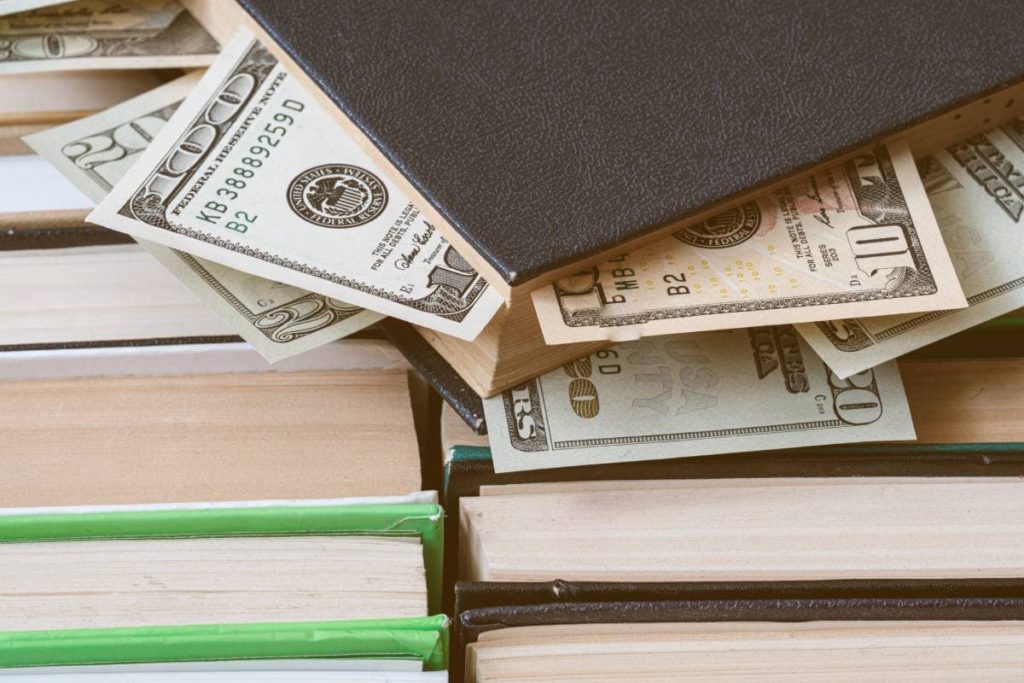Authors’ lives are often portrayed as relaxed and affluent in movies and books, but this isn’t the reality for the majority of authors. Of course, there’s still a chance to earn money, although it may not be enough to quit your day job. Even still, many aspiring writers want to know how many books they need to publish to start earning an income.
You need to publish one book to make money. Making money as an author isn’t dependent on how many books you publish but on the quality of your books and how well you market them. You could self-publish 10 books and not earn anything, but publish one well-crafted book, and you could earn thousands.
This article will show you how to earn money with less work and how much you can make from self-publishing as well as through traditional methods. Read on to learn more.

Publishing More Books Doesn’t Mean More Income
Authors earn money through the sales of their books, whether through a traditional publishing company or a self-publishing platform, such as Amazon Kindle Direct Publishing. No matter which publishing route an author chooses, they earn money based on the number of copies sold, not the number of books published.
For example, an author could write 20 books and sell only 10 copies of a single title, whereas another writer could compose a single book and sell thousands. People don’t read books because the author wrote hundreds of them, but rather, they read because they enjoy the content.
It’s not about the number of books an author writes but the quality of the books that earns them money. Of course, authors must market the books as well because you can’t sell a book if nobody knows it exists.
How Do Authors Earn Money
To reiterate, authors don’t need to publish multiple books to earn an income. Now, let’s discuss exactly how authors make money, as well as their earning potential.
Book Advances
When publishing a novel through a traditional publishing house, the company sometimes pays the author an “advance” on the book.
The advance essentially covers the living expenses of the writer while they write the novel.
Once the author finishes the book, it’s marketed and published. From there, it begins to sell, from which the author earns “royalties.” However, authors do not receive any royalties until they pay back the advance in full, assuming an advance was provided.
Can First-Time Authors Get Book Advances?
Publishing companies do not typically pay large advances to first-time authors or those who aren’t already well-known by the general public. In fact, new authors rarely receive an advance at all.
If an advance is offered to a first-time author, it’s usually only around $5,000.
Publishers usually reserve advances for those with a history of writing best-sellers or those with a very high probability of success, such as celebrities, athletes, CEOs, politicians, or other high-profile individuals. To receive an advance, the author must have a publishing contract with the publisher.
Again, advances must be paid back once you begin earning money from the sale of your book. You pay the advance back using royalties.
Royalties
Self-published and traditionally published novels both have the potential to earn royalties, which is the money earned through the sale of the book. Authors do not receive 100% of the royalties earned, as a cut is taken to pay the agent and publisher or the publishing platform if you go the self-publishing route.
How Much Can You Earn on One Book?
Standard royalties from a publishing company typically look something like the table below:
| Book FormatStandard RoyaltiesHardcover20-30%Trade Paperback15%E-Book25% |
To further explain how royalties work and earning potential, we’ll create a hypothetical situation.
Ann submits a book proposal to a publishing house. The publisher decides to move forward with Ann’s proposal and provides her with a $5,000 advance. Ann agrees to earn 10% royalties on the sale of each book. The publisher prices each book at $15, so Ann should receive $1.50 per book sold, but she still owes the advance.
Ann wouldn’t see a cent of her royalties until the advance was paid in full, which means that she would need to sell around 3,333 books just to pay back the advance. After Ann pays the advance, she’d need to sell an additional 10,000 books to earn her first $15,000.
Self-published authors, however, do not receive advances since they don’t work with a publisher.
As such, they begin earning royalties as soon as the book sells its first copy. The self-publishing platform takes a cut, but it’s usually between 30% to 65%, depending on the price and format, leaving you with 35% to 70% of the royalties.
This is significantly higher than most traditional publishing companies, but it’s unlikely to make you a millionaire.

How Many Books Should I Expect To Sell?
Most self-published authors sell 250 books or less, regardless of how many different books they write. Traditionally published books sell around 3,000 copies on average, with only 250 of those sales in the first year.
It’s rare that books sell over 100,000 copies and even rarer to sell more than a million.
Nonfiction is one of the less popular genres, with fantasy, science fiction, and romance being in the top ten. The average nonfiction book, such as biographies, autobiographies, or memoirs, sells less than 250 copies per year, and rarely do these books exceed sales of 3,000 copies over the course of the book’s lifetime.
That means that if Ann (the imagined author in our hypothetical situation in the previous section) wrote a memoir and sold only 3,000 copies of her book, she’d be in debt to the publisher, as she wouldn’t have earned enough royalties to pay back the advance she owed. However you usually don’t have to pay back an advance.
As you can see, authoring a book only because you desire to become rich and famous may end in disappointment. While $15,000 may sound like a lot of money, it could take years to sell 10,000 books. Selling 10,000 books in less than a year isn’t the reality for most authors, as most sell considerably less.
Conclusion
Despite the low earning potential, regardless of how many books you publish, you shouldn’t give up on your aspirations to become a published author. As long as you’re writing for the love of writing and not just for the money, it’s still a rewarding venture, even if you only publish a single book.
Who knows? You could end up becoming the year’s best-selling author!

